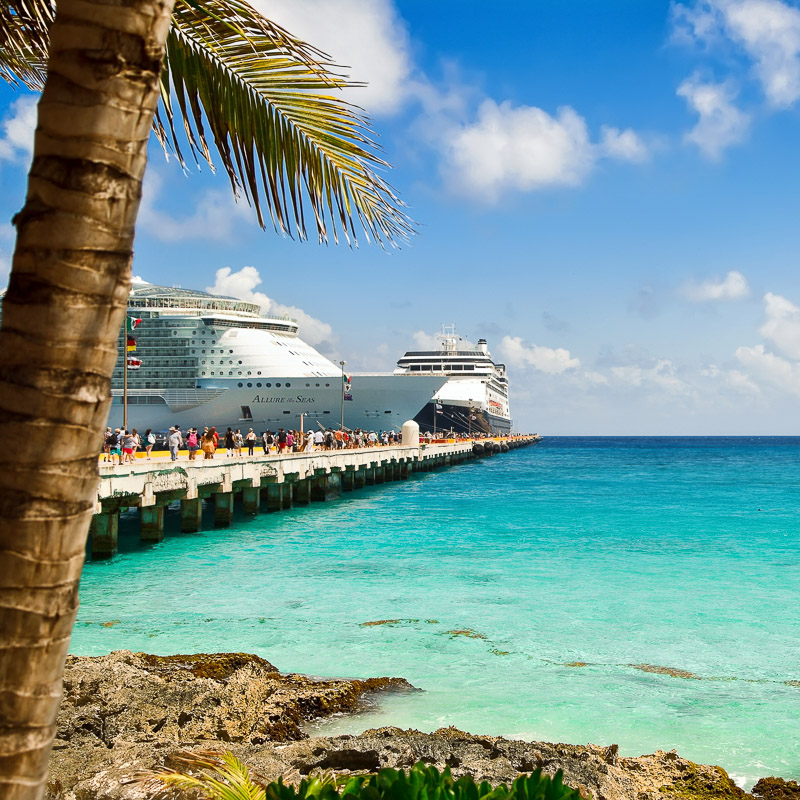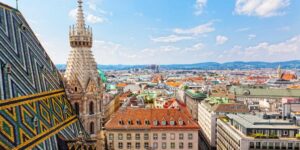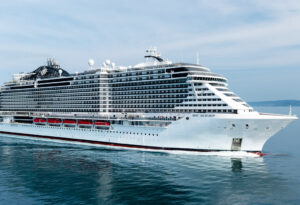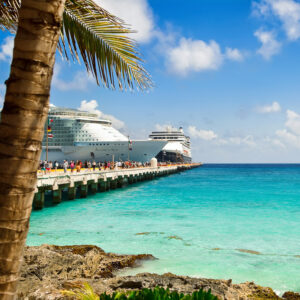MEXICAN RIVIERA CRUISE PORTS: HOW SAFE ARE THEY NOW?

Costa Maya, Mexico - April 05, 2019: Cruise ship Royal Caribbean Allure of the Seas docked at port Costa Maya. The tourist region is a popular Caribbean cruise destination
In February, my husband and I embarked on a seven-night cruise to the Mexican Riviera. We sailed on Norwegian Cruise Line’s ship, Norwegian Joy. I posted on my Instagram and Facebook pages about how much I enjoyed my visit.
A friend responded on Instagram, “It’s good to see Mazatlan back on the cruise schedule.”
But why was it even off? I didn’t even know that it had been at all.
Two days later, a news story answered my question. The US State Department issued updated travel advisories for a Mexico visit, with a half dozen states designated as Do Not Travel, the highest level of caution for travelers.
One of these was Sinaloa, the state where Mazatlan is the largest city. Yet, cruise lines are heading there and allowing their guests to visit.
TRAVEL ADVISORIES: IS MEXICO SAFE TO VISIT?
Seven other states have a Reconsider Travel classification. Two of these, Jalisco and Baja California, have Puerto Vallarta and Ensenada as regular scheduled stops for cruises. The final port, Cabo San Lucas, is in Baja California Sur, which has an Exercise Increased Caution. We visited all these cities on our own cruise.
While these classifications are ultimately advisories, they cause some concern for travelers going to visit Mexico. Cruise lines pulled Mazatlan from their itineraries in 2011 after drug cartel violence increased, but they gradually returned two years later.
In this ensuing decade, incidents of cruise guest crime have been negligible. Other ports, including Acapulco and Manzanillo, remain off-limits to cruise travelers.
Most Americans going to Mexico by cruise will likely be safe while in these Pacific Coast ports. Including those who choose to explore a city on their own and don’t wander off away from areas populated with tourists.
Our own experience in these Mexican Riviera stops was uneventful, and we did not see anything that would indicate cartel danger or violence.
Mazatlan was the only place where we noticed missing persons flyers posted in a town square. A few police patrolled areas where visitors gathered, but we never felt that our safety was in question, either here or in any other city.
CABO SAN LUCAS
On our first stop, my husband and I took a tender with other Norwegian Joy guests and headed to the busy marina. From there we traveled by bus to our shore excursion.
With another cruise ship in port, there were more visitors around than usual, but we always felt safe. On our activity near Todos Santos, we took e-bikes around and on the seashore with Cabo Adventures.
When we returned to the marina and an awaiting tender, we never saw any police presence and didn’t feel concerned in any way. The large tourist presence likely contributed to our feeling safe.
PUERTO VALLARTA
Stopping in this bustling city with its dozens of resorts and chain stores was almost like being in an American city. Buses herded cruise guests to different excursions, ranging from whale watching to parasailing to city tours, which is what we did. Like Cabo San Lucas, we never considered threats to our personal safety.
Even when we explored the most popular area of the city, the Malecon and the Church of Our Lady of Guadalupe, there wasn’t any police or military presence on the streets. Again, going on an organized shore excursion helped us feel secure.
MAZATLAN
This coastal city is once again included in most cruise schedules. There is some law enforcement stationed on the Blue Line route that guides visitors from the port area to the central areas of town.
Unlike Cabo San Lucas and Puerto Vallarta, we ventured on our own, following the Blue Line to a town square. Then on to the Pino Suarez Central Market and the Basilica Cathedral.
Later, we walked toward the Malecon before heading back to the ship. Even with finding out that Mazatlan was the “least” safe of all the ports, we were happy to explore independently here.
ENSENADA
The last port on our cruise was this growing city 60 miles south of the U.S.-Mexican border. We chose once again to go on our own. We did not encounter any problems doing this. Others from the ship went on shore excursions such as the trip to the wine country northeast of the city or La Bufadora, a natural blowhole.
We mostly stayed around the waterfront Malecon, which is a pedestrian-friendly enclave with a central water fountain feature and stores and restaurants further away. This was probably the destination where we felt the safest, with families strolling the walkway and relaxing for the day.
In sum, when asking, is Mexico safe to visit? The best strategy to handle cruise port travel to the Mexican Riviera is to be aware and employ safety whenever possible. Stick with organized excursions, but if you want to explore on your own, stay in the tourist-friendly areas of town.






